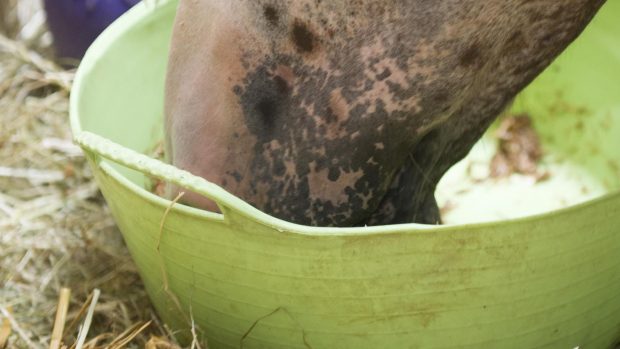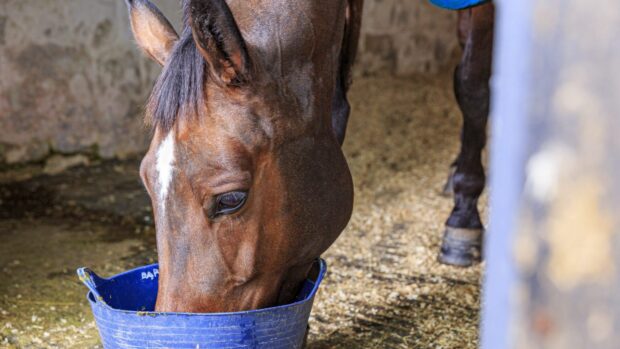As well as calculating the quantity of feed a horse needs daily, owners also need to decide which type of feed to use. Straights can seem a cheaper option than pre-mixed (compound) feeds, but they leave the owner responsible for ensuring the horse gets all the correct nutrients.
Compound feeds are complete rations, normally available in either a cube or mix form, which are fed alongside good quality forage. Almost 200,000 tonnes of compound feed are sold each year in the UK and an extremely wide range is available including specialist feeds, which have been developed for horses that cannot eat large quantities of cereals, and diets for veteran and convalescing horses.
Oats, barley, maize, bran and wheat are all straights. They are a non-complete feed when fed with forage: this means they will not give your horse all the important vitamins and minerals. Hence, a vitamin, mineral and protein balancer should be added to the ration. Specifically designed oat balancers are available and it is recommended that if you are feeding barley you use an extruded product, which will contain added vitamins and minerals.
Getting the balance right
Providing sufficient forage is available, compound feeds will give your horse a balanced diet, when fed according to the manufacturer’s recommendations. The cereals included in compound feeds are analysed for their nutritional quality before undergoing a number of processes, which help improve their shelf life and improve their digestibility.
Feeding a balance diet with straights is much more difficult. Straights are commonly low in essential minerals such as calcium, vitamins and the essential amino acid lysine. The horse cannot make lysine and therefore it must be provided in the diet. Insufficient lysine will mean the horse cannot process protein correctly and will result in loss of condition, poor hoof growth and coat condition.
Feeding cereals such as oats will also result in imbalances in the calcium:phosphorus ratio. This can cause bone problems, particularly on young animals. Any straights diet will need supplementation to ensure the horse gets all the vitamins and minerals it requires for good health.
Compound feeds can appear expensive, particularly specialist diets such as those designed for breeding horses. In comparison straights appear much cheaper. However, you need to take into account the cost of a cereal balancer or a vitamin and mineral supplement needed to ensure the diet is nutritionally balanced.
Furthermore, mixing and preparing straights can be very time consuming. Usually you will find that feeding compound feeds is both easier and more economical than feeding straights and you can be sure your horse is getting all the nutrients he requires.
Straights: Pros
- Appear cheaper
- Palatable
- Offer owner more control
Straights: Cons
- Quality can vary
- Difficult to ensure a balance diet
- Imbalances can lead to laminitis, colic and tying-up
Compound feeds: Pros
- Easy to feed
- Give a balance diet
- Consistent quality
- Researched
- Flexible
Compound feeds: Cons
- Can be expensive
- Can look boring, especially nuts
Advanced event rider Vanessa Lloyd Davies uses Dodson & Horrell’s Performance Concentrate with oats for her horse Gino.
Vanessa says: “Gino is so laid back, he’s horizontal, so it’s great to be able to use oats in his diet but still know I’m providing all the minerals and vitamins he needs. Provided I feed a minimum of 1-1.5kg Performance Concentrate per day, I can vary the amount of oats he gets depending on how he is performing.”
Dressage rider Damien Hallam feeds Dodson & Horrell’s compound feeds to his horses.
Damien says: “With a large busy yard it is not practical to spent ages preparing and mixing straights. Using a compound is cheaper, takes up less storage in the feed room and I know my horses are getting all the vital nutrients they require, to perform at their best each time.”
|
Compound feed V straights
Whether you decide to feed a compound feed, or a diet made up of straights, are a number of products that can be incorporated into your horse’s diet but each horse should be treated as an individual, so ask advice from your vet and a nutritionist. Dodson & Horrell has a wide range of compound feeds, supplements and forage that are suitable for all types of horses including performance horses, breeding stock, leisure horses and veteran horses. For further information and friendly feeding advice call the Dodson & Horrell Feed Helpline (tel: 0870 442 3322) Normal national call rates apply, or visit: www.dodsonandhorrell.com |



